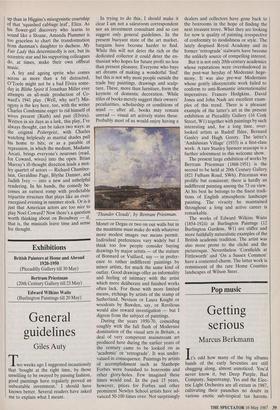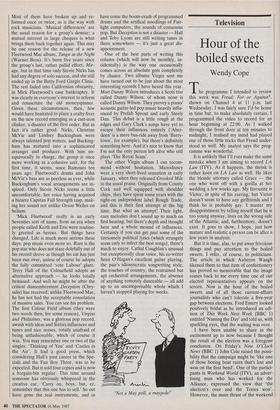Pop music
Getting serious
Marcus Berkmann
It's odd how many of the big albums bands of the early Seventies are still chugging along, almost unnoticed. You'd never know it, but Deep Purple, Bad Company, Supertramp, Yes and the Elec- tric Light Orchestra are all extant in 1987, cultivating their paunches no doubt in various exotic sub-tropical tax havens. Most of them have broken up and re- formed once or twice, as is the way with rock musicians. 'Musical differences' are the usual reason for a group's demise; a mutual interest in large cheques is what brings them back together again. This may be one reason for the release of a new Fleetwood Mac album, Tango in the Night (Warner Bros). It's been five years since the group's last, rather pallid effort, Mir- age, but in that time only Stevie Nicks has had any degree of solo success, and she still ended up in the Betty Ford Gargle Clinic. The rest faded into Californian obscurity, in Mick Fleetwood's case bankruptcy. It was clearly in everyone's interest to reform and resuscitate the old moneyspinner. Given these circumstances, then, few would have hesitated to place a crafty fiver on the new record emerging as a cast-iron clinker, a disaster of the first order. But in fact it's rather good. Nicks, Christine McVie and Lindsey Buckingham were always talented pop writers, and Bucking- ham has matured into a sophisticated arranger and producer. With him un- equivocally in charge, the group is once more working as a cohesive unit, for the first time, it seems, since Rumours ten years ago. Fleetwood's drums and John McVie's bass are as peerless as ever, while Buckingham's vocal arrangements are in- spired. Only Stevie Nicks seems a little uncomfortable, her voice having acquired a bizarre Capstan Full Strength rasp, mak- ing her sound not unlike Orson Welles on helium.
`Mick Fleetwood' really is an early Seventies sort of name, from an era when people called Keith and Eric were routine- ly greeted as heroes. But things have changed. Life is much more serious these days, pop music even more so. Rare is the pop star who does not stare dolefully out of his record sleeve as though his cat has just been run over, unless of course he adopts the fully committed 'vote Labour' glare. Terry Hall of the Colourfield adopts an alternative approach — he looks totally bemused. And well he might be after the critical dismemberment Deception (Chry- salis) has received; unlike Fleetwood Mac, he has not had the acceptable consolation of massive sales. You can see his problem. The first Colour Field album (they were two words then, for some reason), Virgins and Philistines, was a glorious pop record, awash with ideas and Sixties influences and tunes and nice noises, totally unafraid of being unfashionable, which of course it was. You may remember one or two of the singles: 'Thinking of You' and 'Castles in the Air'. It had a good press, which considering Hall's past career in the Spe- cials and the Fun Boy Three, was to be expected. But it sold four copies and is now a bargain-bin regular. This time around someone has obviously whispered in the creative ear, 'Carry on, boys, but, er, remember that this one has to sell.' So out have gone the real instruments, and in have come the boom-crash of programmed drums and the artifical noodlings of Fair- light computers, the sounds of consensus pop. But Deception is not a disaster — Hall and Toby Lyons are still writing tunes in there somewhere — it's just a great dis- appointment.
One of the best parts of writing this column (which will now be monthly, in- cidentally) is the way one occasionally comes across an absolute gem completely by chance. Two albums Virgin sent me have turned out to be just about the most interesting records I have heard this year. Meet Danny Wilson introduces a Scots trio called Danny Wilson, of whom none is called Danny Wilson. They purvey a piano/ acoustic guitar-led pop music heavily influ- enced by Prefab Sprout and early Steely Dan. This debut is a little rough at the edges and Gary Clark's songs have yet to escape their influences entirely (`Aber- deen' is a mere bus-ride away from Tarry- town', for example), but there's definitely something here. And it's nice to know that I'm not the only person left alive who still plays 'The Royal Scam'.
The other Virgin album I can recom- mend without hesitation. Microdisney were a very short-lived sensation in early January, when they released Crooked Mile to the usual praise. Originally from County Cork and well equipped with shoulder chips, they have spent some years with the right-on independent label Rough Trade, and this is their first attempt at the big time. But what an attempt! Their light, easy melodies don't sound up to much on first hearing, but there's depth and thought here and a whole mound of influences. Certainly if you can get past some of the tiresomely political lyrics (which strangely seem only to infect the best songs), there's much to enjoy. Cathal Coughlan's unusual but exceptionally clear voice, his co-writer Sean O'Hagan's excellent guitar playing, the pair's idiosyncratic songwriting style, the touches of country, the restrained but apt orchestral arrangements, the absence of anything remotely danceable — all add up to an uncategorisable whole which I haven't stopped playing for weeks.
'Not a May poll, a maypole!'





















































 Previous page
Previous page